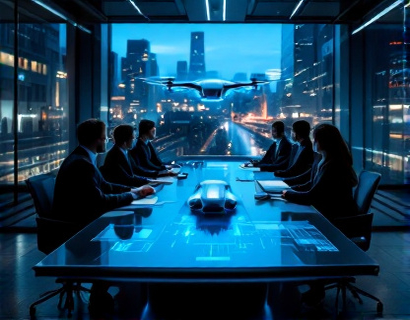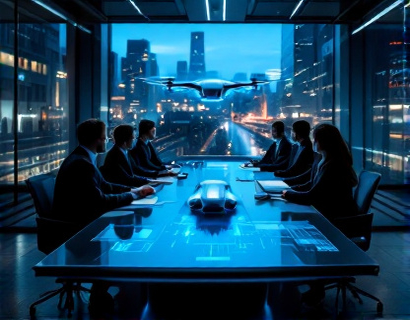AI-Powered Solutions for Aeronautics: Transforming Businesses with Intelligent Agent Technology
The aeronautics industry, a cornerstone of global transportation and commerce, is undergoing a profound transformation driven by advancements in artificial intelligence (AI). Intelligent agent technology, a subset of AI, is playing a pivotal role in revolutionizing how businesses operate within this sector. This transformation is not just about automating routine tasks but about enhancing decision-making, optimizing operations, and driving innovation. For aeronautics businesses, embracing AI-powered solutions is no longer a choice but a necessity to remain competitive and sustainable in a rapidly evolving market.
Understanding Intelligent Agent Technology in Aeronautics
Intelligent agents are software entities that perceive their environment through sensors and act upon that environment through actuators. In the context of aeronautics, these agents can process vast amounts of data from various sources, including flight operations, maintenance records, and market trends. By leveraging machine learning algorithms, natural language processing, and predictive analytics, intelligent agents can provide tailored insights and automated solutions that address the unique challenges faced by aeronautics businesses.
Streamlining Operations with AI Agents
One of the most significant impacts of AI agents in aeronautics is the streamlining of operations. Traditional operational processes in aeronautics are often complex and time-consuming, involving multiple stakeholders and systems. AI agents can automate these processes, reducing manual intervention and minimizing errors. For instance, AI-powered agents can manage flight schedules, optimize routes, and coordinate with ground operations in real-time, ensuring smooth and efficient flight operations.
Consider a scenario where an airline needs to adjust flight schedules due to unexpected weather conditions. An AI agent can quickly analyze weather data, assess the impact on flight routes, and propose optimal alternatives. This not only saves time but also enhances the overall customer experience by minimizing delays and cancellations. Such capabilities are crucial in an industry where punctuality and reliability are paramount.
Enhancing Decision-Making with Data-Driven Insights
Decision-making in the aeronautics industry is complex and often based on incomplete or outdated information. AI agents can change this landscape by providing data-driven insights that inform strategic decisions. By analyzing historical data, market trends, and real-time operational metrics, AI agents can predict future scenarios and recommend actions that maximize efficiency and profitability.
For example, an AI agent can analyze maintenance records to predict equipment failures before they occur, allowing for proactive maintenance scheduling. This predictive maintenance approach not only reduces downtime but also optimizes maintenance costs. Similarly, AI agents can analyze customer behavior and market demand to inform pricing strategies and capacity planning, ensuring that airlines operate at optimal levels.
Personalized Customer Experiences through AI
The aeronautics industry is highly customer-centric, and AI agents can significantly enhance the customer experience by providing personalized services. From personalized travel recommendations to seamless check-in and boarding processes, AI can tailor interactions to individual preferences and needs. Chatbots powered by natural language processing can handle customer inquiries 24/7, offering instant support and improving customer satisfaction.
Moreover, AI agents can analyze customer data to identify patterns and preferences, enabling airlines to offer targeted promotions and loyalty programs. This level of personalization not only enhances customer loyalty but also drives revenue through increased bookings and higher customer lifetime value.
Optimizing Supply Chain Management
Supply chain management is a critical aspect of the aeronautics industry, involving the procurement of parts, maintenance supplies, and other essential materials. AI agents can optimize supply chain operations by predicting demand, managing inventory, and ensuring timely delivery of goods. Machine learning algorithms can analyze historical data to forecast future needs, reducing excess inventory and minimizing stockouts.
For instance, an AI agent can monitor the usage of specific parts across a fleet of aircraft and predict when replacements will be needed. This proactive approach ensures that parts are ordered in advance, reducing the risk of delays due to part shortages. Additionally, AI can optimize logistics by selecting the most efficient routes and modes of transportation, further reducing costs and improving delivery times.
Enhancing Safety and Security
Safety and security are non-negotiable in the aeronautics industry, and AI agents can play a crucial role in enhancing these aspects. By monitoring flight data and operational parameters in real-time, AI agents can detect anomalies and potential safety risks before they escalate. Predictive analytics can identify patterns that indicate potential failures or security threats, allowing for timely interventions.
AI agents can also assist in compliance monitoring, ensuring that all operations adhere to regulatory standards. By automating compliance checks and generating reports, AI reduces the burden on human operators and minimizes the risk of human error. This not only enhances safety but also builds trust with regulatory bodies and customers.
Driving Innovation through AI
The integration of AI in aeronautics is not just about improving existing processes but also about driving innovation. AI agents can facilitate the development of new technologies and services that were previously unimaginable. For example, AI can be used to design more efficient aircraft engines, optimize fuel consumption, and develop advanced avionics systems.
Moreover, AI can enable the creation of new business models, such as on-demand air travel services or integrated transportation solutions that combine air, land, and sea travel. By leveraging AI, aeronautics businesses can stay ahead of the curve and capture new market opportunities.
Challenges and Considerations
While the benefits of AI-powered solutions in aeronautics are substantial, there are challenges and considerations that businesses must address. One of the primary concerns is data privacy and security. Aeronautics businesses handle sensitive information, and ensuring the protection of this data is critical. Implementing robust security measures and adhering to data protection regulations are essential.
Another challenge is the need for skilled professionals who can develop, implement, and maintain AI systems. The aeronautics industry must invest in training and development to build a workforce capable of harnessing the full potential of AI. Additionally, there is a need for clear regulatory frameworks to guide the ethical use of AI in aeronautics, ensuring that innovations do not compromise safety or fairness.
Case Studies and Real-World Applications
Several aeronautics companies have already begun to integrate AI into their operations with notable success. For example, a major airline implemented an AI-powered predictive maintenance system that reduced maintenance costs by 15% and decreased downtime by 20%. Another company used AI to optimize flight scheduling, resulting in a 10% increase in on-time performance.
These case studies demonstrate the tangible benefits of AI in aeronautics, from cost savings and efficiency gains to improved customer satisfaction and safety. As more companies adopt AI solutions, the industry as a whole is poised for significant transformation.
Conclusion
The integration of AI-powered solutions in the aeronautics industry represents a paradigm shift, offering unprecedented opportunities for optimization, innovation, and growth. By leveraging intelligent agent technology, aeronautics businesses can streamline operations, enhance decision-making, and deliver personalized customer experiences. While challenges exist, the potential benefits are clear, making AI an essential tool for sustainable success in this dynamic sector. Embracing AI is not just an option but a strategic imperative for aeronautics businesses aiming to thrive in the future.










































